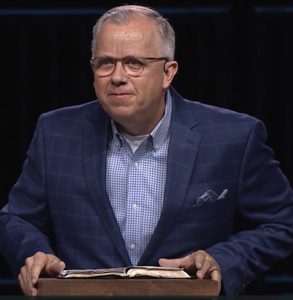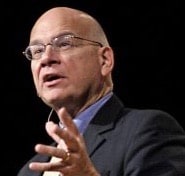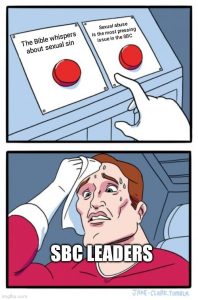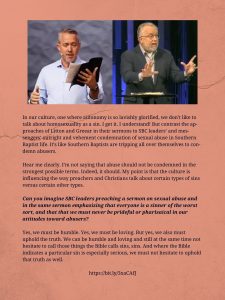Discernment is not knowing the difference between right and wrong. It is knowing the difference between right and almost right.
—Charles H. Spurgeon—
Key point: The culture is influencing the way preachers and Christians think about and talk about sin, and this is evident in a sermon on Romans 1 preached by J. D. Greear and by Ed Litton. Southern Baptists need to recommit to allowing the Scriptures rather than the culture to influence the way they think about and talk about sin. We must never be afraid to uphold the truth.
Last week, a furor erupted over two sermons preached a year apart. Both carried a significant amount of identical content. Did the second preacher plagiarize? Additional videos have surfaced. Decide for yourself.
In January of 2019, Southern Baptist Convention president J. D. Greear, pastor of The Summit Church in the Raleigh-Durham area in North Carolina, preached a sermon titled “How the Fall Affects Us All.” Ed Litton, who was elected Greear’s successor at the annual meeting of the SBC on Tuesday, June 15, 2021 in Nashville, preached a sermon using much of the same material at his church on January 27, 2020. Ed’s church is Redemption Church in Saraland, Alabama, in the Mobile area. The video of Ed’s sermon was unavailable for a short time but apparently is now back up. It was scrubbed from the Redemption Church’s website and from You Tube after the above video prompted observers to accuse Litton of plagiarism. The title of Litton’s message was “Born to Be Wild.”
Both Litton and Greear released statements about the matter. Furthermore, in the wake of the controversy, Redemption Church removed, not just the video of the sermon Ed preached that created such a furor, but scores more. According to Capstone Report,
As damning video evidence surfaced that President of the Southern Baptist Convention Ed Litton borrowed portions of a sermon on Romans 1, Litton’s church removed video evidence from the church website and set over 100 videos to Private on YouTube.…A total of 143 videos were set to Private and unavailable for viewing on YouTube as of 9 a.m. Saturday, June 26, 2021.
![]() Ed said in his statement: “Out of a commitment to full transparency, I have gone back through all the 46 sermons in this series [on Romans]. I have located in some places similar illustrations, quotes or points of application. One shares the same title, and one has a similar outline.” Yet the removal of these and other sermons from Redemption Church’s website raises serious questions.
Ed said in his statement: “Out of a commitment to full transparency, I have gone back through all the 46 sermons in this series [on Romans]. I have located in some places similar illustrations, quotes or points of application. One shares the same title, and one has a similar outline.” Yet the removal of these and other sermons from Redemption Church’s website raises serious questions.
 If Ed is committed to “full transparency,” what might he and his church be hiding by preventing the public from seeing the more than 100 videos the church made inaccessible? The story has been picked up by Newsweek and by AL.com, the state newspaper in Ed Litton’s home state of Alabama.
If Ed is committed to “full transparency,” what might he and his church be hiding by preventing the public from seeing the more than 100 videos the church made inaccessible? The story has been picked up by Newsweek and by AL.com, the state newspaper in Ed Litton’s home state of Alabama.
As Bad as it Is, Plagiarism Isn’t the Only Problem, or Even Necessarily the Worst Problem
The issue of plagiarism is important. Plagiarism, after all, is a violation of the Eighth Commandment against stealing. Even so, another issue arrises that is at least just as critical, and perhaps even more so. The content of the sermons Greear and Litton preached contain a great deal of truth, but they also are tainted with falsehoods and misleading implications. They leave specious impressions, even to the point, I believe, of being potentially dangerous.
The content of the sermons Greear and Litton preached contain a great deal of truth, but they also are tainted with falsehoods and misleading implications.
The sermon is about homosexuality. Its text is Romans 1:18-32. If a preacher wishes to clearly present what the Bible teaches about homosexuality against the backdrop of all the culture’s misinformation about the subject (and certainly he should), it is not enough for him to simply declare that homosexuality is sinful. Let me be clear: J. D. Greear did explicitly declare that homosexuality is sinful, and Ed Litton did as well. Nevertheless, as I have said, this is not enough. I want to explore several of the problems and potential problems with Ed Litton’s sermon in this post. As we do, we also will recall some or all of the problems with the same sermon when Greear preached it in 2019. My list is thorough, but not exhaustive. Keep in mind that our discussion will call for discernment, because the sermon carries falsehoods, ambiguous statements, and misleading impressions cloaked in and surrounded by a great deal of truth. We will consider six specific items.
Here we go.
Item One: Like J. D. Greear, Ed Litton Believes Paul Is Talking About All People in Romans 1:18-32

I wrote about “How the Fall Affects Us All” in 2019. I said the following, with minor adaptations having been made for clarity.
James David—J. D.—Greear, 46 [now 48], is the pastor of the multi-campus Summit Church in North Carolina, a church that sees almost 10,000 in attendance every week. Greear also is the president of the Southern Baptist Convention, having been reelected to a second one-year term at the SBC’s annual meeting in June of 2019 in Birmingham, Alabama. J. D.’s influence is great, so if he gets something wrong, many people potentially will be confused and/or misled.
On January 27, 2019, Greear preached a sermon on Romans 1:24-32. He titled it “How The Fall Affects Us All.” As you might expect from the title, Greear emphasized that in Romans 1:24-32 and the verses surrounding it, Paul paints a picture of what rebellion against God looks like—a rebellion, Greear says, that is common to all people, everywhere. The pastor and Southern Baptist Convention president asserted that Paul even was writing about himself.
I do not doubt that Greear sincerely believes this is what the Scripture teaches. Yet in a sense, with this interpretation he has more leverage to preach against pride and certain other sins named in these verses and to avoid focusing on the uncomfortable topic of homosexuality. If all people are equally rebellious, then anyone who points out specific sins can be accused of not pointing first to himself. If you think other people stand guilty before God, then look in the mirror! After all, pride, (being “proud” or arrogant and “boasters“) — is one of the sins Paul names!
One doesn’t have to believe that everyone is a part of this group of rebellious sinners, though, to understand that he or she must avoid pride. While all are sinners and have rebelled against God, this passage is not saying that all have been equally rebellious. Everyone needs God’s grace and forgiveness, but not everyone has “suppress[ed] the truth in unrighteousness” (Rom. 1:18).
The apostle was writing about a specific group of people (“people who suppress the truth in unrighteousness”) who have descended so far into depravity that “God gave them up to vile impurity in the lusts of their hearts, so that their bodies would be dishonored among them.” (Rom. 1:18,24). Keep this in mind as you continue to read.

Understanding that Paul wrote about a specific group of people in Romans 1 but that Greear sees the apostle as having written about everyone will help you see why Greear tends to be harder on the church than one might expect, and softer on the sin of homosexuality (even though the Summit Church pastor does acknowledge that homosexual activity is sinful.)
On January 26, 2020, Pastor Ed Litton preached a sermon on Romans 1:18-32 that carried a great deal of the same content we find in Greear’s sermon a year before. The title of Litton’s sermon was “Born to be Wild.” Early in his message, he said this:
Thus, Ed makes the same assumption J. D. Greear makes about the identity of those about whom Paul wrote in this portion of Romans 1. Here’s the reality. I’m not saying either Greear or Litton consciously bent to the culture on this, but we see the culture’s influence in the assumption that Paul was writing about everyone. There’s no question about it: Calling out homosexuals for their sins is a lot easier for a preacher if he first neutralizes the significance of homosexual sins by saying they are no worse than any other sin. However, Scripture does not support the idea that all sins are equal. Nor does it support the idea that sexual sins are equal in weight with other sins (see 1 Cor. 6:18-20; also go here and here).
Item Two: Litton Emphasizes that the Bible Offers No Classifications of Heterosexual or Homosexual.
There is much to commend in these statements, for there is a great deal of truth here. Yet there also is an opening large enough for a homosexual activist to drive a truck through! In the quote below, note the portion in bold type. Ed said,

Since God made us in His image, He made us, the Scripture says, male and female. Did you know that the Bible never gives the classification of heterosexual or homosexual? You may find a translation that may use the word homosexual, but it’s only because it’s in the modern vernacular. Actually, Sigmund Freud made those classification labels [but] God never does. Why? Because God made us one way. He made us male, and He made us female. If you’re struggling with your identity — and you have my respect if you are, but listen to me — go to Scripture [and ask,] “What does God say I am? What does God say I am?”
Of the statements we are considering in this post, this is the only one Litton made in his sermon that Greear did not in his. Standing alone, the statement that “the Bible never gives the classification of heterosexual or homosexual” can be interpreted to overlook the reality that the Bible explicitly talks about and condemns homosexual activity.1 Yes, like Greear, Litton says Scripture condemns it; but primarily in the context of a condemnation of all sins, as in homosexuality is no worse than any other sin. Do not be surprised if homosexual activists take Ed’s statement out of context to justify their sin.
Item Three: Like J. D. Greear, Ed Litton Implies that Homosexuals Are “Born that Way”
It is true that all people are born with a proclivity to sin, or a sin nature. Moreover, we — every one of us — sin by choice as well, in part because we have been born with this sin nature. Even so, we ourselves bear responsibility for our sin. But the theological truth that we are “born that way” is not the same thing many homosexuals mean when they say they were “born that way.” No scientific evidence exists that they were homosexuals at birth, and this should have been emphasized. Greear made the same mistake in his sermon as well. See item 3 in this article.
Item Four: Like J. D. Greear, Ed Litton Says the Bible Whispers About Sexual Sin and Shouts About Materialism and Pride
This, folks, is a huge problem. Greear said this as well. Here is what we said when we objected to this same assertion from Greear. The objections also apply to Litton.

Homosexuality isn’t the only sin named in Romans 1:18-32, but no one can give the passage a fair reading and come away from it without realizing that homosexuality is an extremely serious sin God will harshly judge.
Despite this, Greear emphasized instead that God’s Word “shouts” about pride and materialism and “whispers” about sexual sin.…Greear proclaims,
Jen Wilkin, who’s one of our favorite Bible teachers here and who’s actually leading our women’s conference, says we ought to whisper about what the Bible whispers about, and we ought to shout about what it shouts about. And the Bible appears more to whisper when it comes to sexual sin compared to its shout[ing] about materialism and religious pride. [In Greear’s recently released statement, the pastor of Summit Church emphasized that compared is a key word. As we will see, keeping this in mind does not eliminate the problems.]
How can J. D. say this in light of 1 Corinthians 6:9-11,15-20 and in light of Nathan’s bold confrontation of King David about his adulterous affair with Bathsheba and his setting the stage for the murder of Bathsheba’s husband Uriah? And these are just two of many passages of Scripture we could cite.
In this Founders Ministries video, Dr. Robert A. J. Gagnon, a theologian an professor at Houston Baptist University, addresses the question of whether the Bible “whispers” about sexual sin.2
There’s something else. J. D. Greear, Ed Litton, and other Southern Baptist leaders who say the Bible “whispers” about sexual sin (even “compared to” its “shout about materialism and pride”) have painted themselves into a corner. How can they condemn sexual abuse in the SBC in the strongest possible terms if the Bible “whispers” about sexual sin? The following meme showcases the quandary SBC elites face.
Item Five: Like J. D. Greear, Ed Litton Effectively Minimizes the Seriousness of Homosexuality When He Emphasizes the Importance of Realizing that We are Foremost Among Sinners
In this clip, when Ed Litton talks about “who’s your one,” he is referring to the one each individual in his congregation has chosen as an individual for whom they will pray and with whom they plan to share the gospel.
Of course, we absolutely must always understand we are no less needful of God’s grace than anyone else. No matter how good we are, each one of us is more like Hitler than Jesus Christ. But the weight of Romans 1:18-32 rests on the shoulders of homosexuality as both a manifestation and a result of the underlying attitude of shaking one’s fist in God’s face. This is not to say that other sins are not involved; nor is it to say that the other sins named are not serious. Nevertheless, homosexuality is especially egregious because 1) it is unnatural and 2) it is a blatant affront to God as Creator.
Homosexuality is especially egregious because 1) it is unnatural and 2) it is a blatant affront to God as Creator.
What we said of Greear’s statements in his sermon have application to these statements from Litton, although Greear’s emphasis on this point was especially strong. Greear even came close to saying those who would condemn homosexuality are guilty of pharisaism. Here are the observations when we discussed Greear’s assertions in his sermon.
While Greear does acknowledge that same-sex behavior is sinful, he comes down so hard on other sins that he effectively minimizes the seriousness of homosexuality.…Greear declared,
Only when you understand [that you are the worst sinner you know] will you [also] understand that if Jesus came to die for you that there is nobody He didn’t die for. And when you finally realize that in your soul, you’ll stop being a judgmental, Pharisaical dispenser of the Law, and you’ll suddenly become a gospel witness. And your life will no longer be characterized by judgmentalism and fundamentalism, and it’ll be characterized by compassion. You’ll start loving your neighbor like somebody made in the image of God, and feeling compassion for them in their weakness. You’ll begin to treat them first and foremost like people who deserve compassion—not scorn, or judgment, or a political voting block that we need to marginalize.
When you understand that, then what that means is that you become a person who will, for example, stand up and be among the fiercest advocates for the preservation of the dignity and the rights of LGBT people. Because we recognize that gay and lesbian people are essentially just like us—people made in the image of God like us, and deserving of all the dignity and respect that we desire for us or our children.
There is no them! That’s what Paul is saying. It’s just a big old we!
J. D.! I have a question for you! What rights do LGBT people not currently have that Christians ought to be contending that they receive?
I’ve got other questions as well.
-
-
-
- Was Nathan being prideful when he confronted David about his affair, or should he have shown greater compassion and worked diligently to protect and secure David’s and other adulterers’ rights?
- Had you been given the chance, would you, Pastor Greear, have told Nathan, “There is no them! It’s just a big old we!”?
-
-
Litton didn’t say all the problematic things J. D. said that we’ve noted here, but the bottom-line problem exists in his message too. Whatever else it warns about, Romans 1:18-32 warns about the sin of homosexuality. To minimize this warning by saying all are guilty and deserving of hell is to misrepresent the text. As we said previously,

Not only were LGBT individuals who listened to J. D.’s sermon not sufficiently warned, but people who might potentially warn them were effectively “neutralized” by accusations of pride and Pharisaism from Greear. Do not misunderstand. No Christian ever should see himself or herself as any less needful of God’s grace than anyone else. Pride is a horrific sin. But you can mark it down. It isn’t just the religious who need to be warned about pride. It’s also those who’ve embraced pride as a mantra under which they practice egregious and unnatural sexual behavior. When God gives these people over to their unnatural desires, severe consequences ensue. God’s people must warn them so they can avoid His wrath by repenting of their sins and relying on Christ for salvation. This is true compassion.
Item Six: Like J. D. Greear, Ed Litton Stated He “Knows” that Homosexuality Doesn’t Send a Person to Hell “Because” Heterosexuality Doesn’t Get Anyone into Heaven

Timothy Keller, JD Greear, and Ed Litton are three preachers who have said they “know” homosexuality won’t send anyone to hell “because” heterosexuality doesn’t get anyone into heaven. I’m sure many other preachers have joined them
These are foolish statements, and when homosexuals hear them, their natural response is relief: “Whew! My homosexuality won’t send me to hell!” Churches are tripping all over themselves to apologize to homosexuals for being judgmental in the past. Of course we need to be loving and gracious, and we must realize we need God’s grace just as much as everyone else. Even so, loving in a biblical sense also means upholding the truth — like the truth contained in the eight bulleted Bible passages in this article.
We Don’t Like to Talk About Homosexuality
This post is a reminder that in our culture, one where autonomy is so lavishly glorified, we don’t like to talk about homosexuality as a sin. I get it. I understand! But contrast the approaches of Litton and Greear in these sermons to SBC leaders’ and messengers’ outright and vehement condemnation of sexual abuse in Southern Baptist life. It’s like Southern Baptists are tripping all over themselves to condemn abusers.
Hear me clearly. I’m not saying that abuse should not be condemned in the strongest possible terms. Indeed, it should. My point is that the culture is influencing the way preachers and Christians talk about certain types of sins versus certain other types.
Can you imagine SBC leaders preaching a sermon on sexual abuse and in the same sermon emphasizing that everyone is a sinner of the worst sort, and that that we must never be prideful or pharisaical in our attitudes toward abusers?
Can you imagine SBC leaders preaching a sermon on sexual abuse and in the same sermon emphasizing that everyone is a sinner of the worst sort, and that that we must never be prideful or pharisaical in our attitudes toward abusers?
We see the culture’s influence in the way we approach abortion as well. In summarizing the 2-day SBC meeting in Nashville, Jon Harris included this item.
-
-
- The SBC: We can’t adopt language calling a mother who has an abortion sinful! (Standing ovation)
- Also the SBC: Abusers must be condemned in the strongest possible terms!!
-
Yes, we must be humble. Yes, we must be loving. But yes, we also must uphold the truth. We can be humble and loving and still at the same time not hesitate to call those things the Bible calls sins, sins. And where the Bible indicates a particular sin is especially serious, we must not hesitate to uphold that truth as well.
Jesus is our example. After effectively challenging those who were ready to stone a woman caught in adultery, the woman’s accusers walked away. Jesus asked the woman,
“Where are those accusers of yours? Has no one condemned you?”
She said, “No one, Lord.”
And Jesus said to her, “Neither do I condemn you; go and sin no more.”
May God grant us courage and wisdom to call sin what it is, but also to unwaveringly point people who are trapped in sin to Christ and the forgiveness He offers.
Because sin is serious — deadly serious.
Copyright © 2021 by B. Nathaniel Sullivan. All rights reserved.
Unless otherwise indicated, Scripture has been taken from the New King James Version®. Copyright © 1982 by Thomas Nelson, Inc. Used by permission. All rights reserved.
Notes:
1By the way, in Scripture, homosexuality isn’t an identity, but an activity. — Joe Dallas and Nancy Heche, eds., The Complete Christian Guide to Understanding Homosexuality: A Biblical and Compassionate Response to Same-Sex Attraction, (Eugene, OR: Harvest House Publishers, 2010), 99.
2Here is Dr. Gagnon’s written statement about Greear’s sermon. He posted it on Facebook on June 26.



I am new to your website and the e-mails – I enjoy receiving from you. I truly believe that GOD was involved in our connection. As a Methodist, I understand and appreciate your insight on the problems of faith within the SBC because the Methodists are facing and avoiding the controversy of the CRT and the LGBT !
I have wandered for years looking for the purpose GOD has in HIS plan for me in HIS kingdom here on Earth! Your comments and insight on the part we Christians must play in saving freedom America is of great importance to me since I have been blessed with three great grandchildren. It is my duty to insure that they have the same freedoms and joys in their lives that I have blessed in my life.
At the moment I am guided by the two following statements:
Ephesians 6:12 For our struggle is not against flesh and blood, but against the rulers, against the authorities, against the powers of this world’s darkness, and against the spiritual forces of evil in the heavenly realms.
“For everything there is a season, and a time for every matter under heaven,” preached Rev. John Peter Muhlenberg, from the book of Ecclesiastes 3:1.
He closed his message by saying: “In the language of the Holy Writ, there is a time for all things. There is a time to preach and a time to fight. And now is the time to fight.
I just wanted you to know that you are appreciated. And I look forward to walking this path with you.
Deus Vult !!
Chuck, Many thanks for reaching out and for your inspiring words. The verses you shared are a source of great blessing to me. How blessed you are to have three great-grandchildren! May God enable each one of us to remain faithful to Him as we seek to uphold biblical truth in the church and in the nation. May God continue to bless you richly! — B. Nathaniel Sullivan